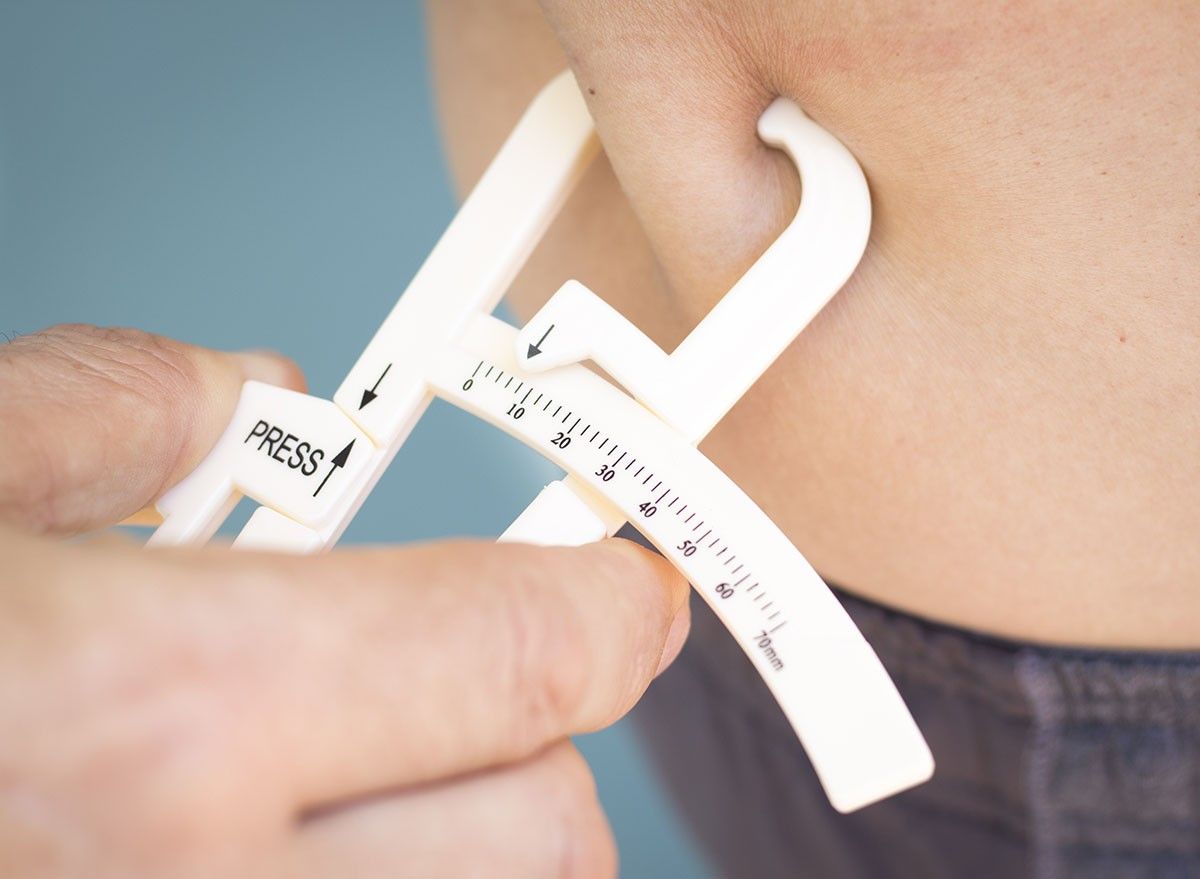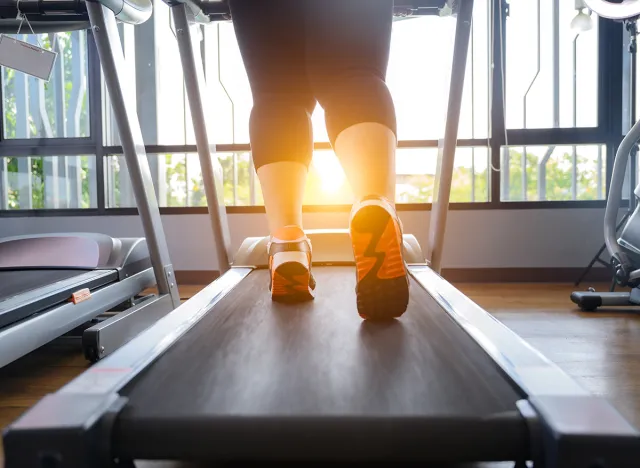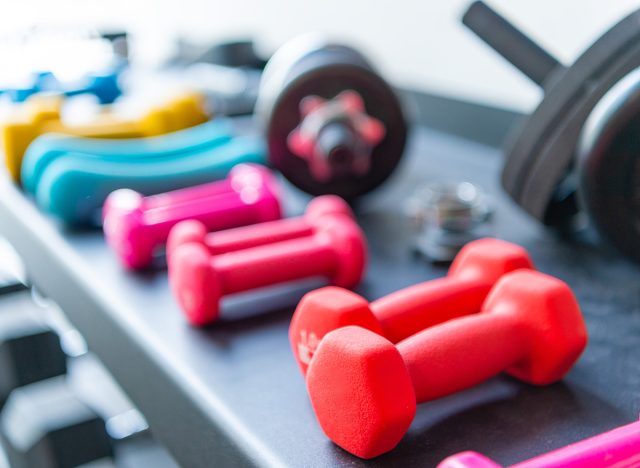7 Red Flag Signs You're Burning Muscle (Not Fat)
You might be excited that you are losing weight, but are you really losing the right kind? Autumn Bates (@autumbates) is a Clinical Nutritionist with a Master's in Nutrition Human Performance. She is also a social media influencer with hundreds of thousands of followers, known for revealing tips on healthy eating, weight loss, and intermittent fasting. In a recent social media post, Autumn revealed "the seven clear signs that you're probably burning muscle and not body fat."
It's Important to Lose Body Fat, Not Muscle Mass
"When looking to achieve a weight loss goal, we should always be focused on losing body fat while not losing any or very little muscle mass. When we lose muscle, it results in a slower metabolism and becoming more carb-sensitive, making it a lot easier to regain the weight that we just lost. Not to mention, it just makes us less metabolically healthy," Autumn says in the video.
There Are 7 "Clear Signs"
"It's super important you know the signs of when you're actually losing muscle so that you can shift gears and make changes asap. So I'm going to share these seven clear signs that you're losing muscle and not fat," Autumn continues.
Sign 1: You Are Gaining Body Fat

The first sign is that you're gaining body fat. "Now, it is actually possible to lose weight while still gaining body fat so that the scale could be going down, but you could actually be gaining body fat. That's why it's really important actually to measure the right thing," Autumn says. "I never recommend just using the scale."
Use the Right Measurements, Like InBody

"You want to use measurements that actually track body fat as well as muscle mass. My favorite option is the InBody. It actually breaks down body fat and muscle mass in pounds as well as percentages. So you can actually see where that weight loss or weight gain is coming from because if you're gaining weight, but if it's all from muscle, that's actually a good thing," Autumn says.
If You Are Losing Muscle While Gaining Fat, Your Metabolism Is Slowing Down

"The body's going to be stronger. You're going to have a healthier metabolism, and overall, you're actually making progress toward body recomposition. But if you're losing muscle while gaining body fat is actually making it so the metabolism is slower, you're in a less healthy metabolic state, and you're much more likely to gain back the weight that you lost," Autumn points out.
You Can Also Use a Tape Measure

"You could also use a tape measure, which is a better form of measurement than just a typical scale," she says. "The InBody can often be found at a gym, or sometimes you can find at a local health food store."
Sign 2: You Are Losing Muscle Mass
"The second is that you're losing muscle mass," Autumn continues. "This is what happens when you simply just eat less without actually paying attention to the right types of foods to help hold onto muscle mass. So if you're using the typical eat less, move, more strategy of just calorie restriction and doing a lot of cardio or just a lot of movement in general, this is the common outcome."
This Happens When You Drop Your Calories, and You Don't Exercise

"Let's say you're focused on just counting calories, reducing calories, and you drop down to 1600 calories. You start to lose weight on the scale, and so you think you're making progress, but then suddenly, you hit a plateau. So you think, okay, I need just to eat a little bit less. So you drop your calories by another 200. You break through that plateau, and you start to lose weight again, just on the scale. Then you plateau again, and you can see how this process repeats itself. So, in order to continue seeing results, you have to keep eating less and less and less, but if you're actually keeping track of the right measurements, you would see that that weight loss was coming from muscle and not body fat, or at least largely from muscle, which is why you had to keep eating less and less and less in order to achieve or maintain those results," Autumn says.
Muscle Mass Prevents This From Happening

When we have more muscle mass, it actually gives us a lot more flexibility with the types of foods we can be eating to help support our goals or even maintain our goals, and it helps to prevent this issue of having to eat less and less and less in order to achieve those goals.
Sign 3: You're Feeling Exhausted After Working Out

The third sign is that you're feeling exhausted after a workout. "This is actually a big sign of overtraining, and one of the results of overtraining is actually losing muscle mass," Autumn says.
This Happens From Overtraining

"Good high-quality training that's well structured should make you feel more energized for the day and not totally wiped out. When you're in a state of overtraining, it's really common to either go into the workout feeling burnout or to come out of the workout feeling burnout, whichever it is. You shouldn't be feeling excessively burnt out after the workout," Autumn says.
A Lot of People Don't Know They Are Overtraining

"What's tricky about this one is a lot of people don't think they fall into this category because maybe they're not working out every single day, and so they assume that there's no way they could be overtraining. But a lot of people actually fall into this trap of overtraining because they don't consider the other stressors in their life over training results because we don't have enough time to recover from stressors. Typically, we would just think of the stressor coming from exercise, but it can come from other stressors as well. Like for example, if you stand a lot at work, that is a big stressor on the body, or if you're eating a really poor diet, that is also a stressor on the body, or if you have just a lot of mental or emotional stress, again, another stressor on the body," says Autumn.
Make Sure to Give Your Body Rest and Repair
"So if you're not getting adequate rest and repair from your workouts while also accounting for the other stressors in your body, whether it be physical or mental, this can also lead to a state of overtraining. And the horrible irony of it is that from the state of overtraining, you start to see the reverse of what you're actually trying to achieve. You start to see muscle being lost as well as body fat increasing. So a lot of people try to overcorrect the wrong direction and add in more workouts, which is actually just making the problem worse," Autumn says.
Sign 4: You Are Feeling Weaker

The fourth sign is that you're feeling weaker. "This really goes along with the overtraining. If you find that with your workouts you can no longer do the same intensity or you're not progressing with your workouts, but instead maybe you're actually regressing, then you're probably losing muscle mass," Autumn says.
RELATED: 7 Healthiest Foods You Need in Your Diet Every Day
You Can't Lift the Weights You Used to Be Able To

"So if maybe in the past you're able to use 15-pound dumbbells, but now you can only use like 12 or 10-pound dumbbells, and that is a huge red flag, you should be getting progressively stronger when you're actually maintaining or even increasing muscle mass a bit and not getting weaker," she explains.
Sign 5: You Aren't Sleeping Well

"The fifth is you're getting poor sleep, and specifically, you're getting poor sleep all of a sudden. Like if you've always had poor sleep, there could be other issues going on, like you don't have a good bedtime routine or maybe some nutrient deficiencies," Autumn says.
If You Aren't Eating Enough, You Could Be Having Cortisol Spikes and That Can Disrupt Sleep Hormones
"But if suddenly, especially if you are on some type of body recomposition journey, you're noticing that you're not getting great sleep or you're waking up throughout the night, this is also another huge red flag because when you're not eating enough to help support body recomposition and therefore could be losing muscle mass, this can result in cortisol spikes throughout the day," Autumn says. "That can disrupt our sleep hormone melatonin, which makes it much more likely that you're going to have either restless sleep or wake up often throughout the night. If, instead, you're getting deep, high-quality sleep every single night, then this is a good sign that you probably are on the right track."
Sign 6: You Are Feeling Cold All the Time

The sixth sign is that you're feeling cold all the time, "especially again, if this is a sudden change," Autumn says. "When we aren't eating enough to support our body's needs during body recomposition, this can lead to the body having difficulties with regulating internal temperatures, plus having muscle mass actually helps to keep us warm. It's a big portion of actually regulating our body temperature. So if you're losing muscle mass, it's getting harder for the body to actually maintain a consistent body temperature and therefore could result in you feeling colder more often, especially when other people aren't feeling very cold."
RELATED: I Lost 100 Pounds by Walking Every Day: Here Are My Hacks
Sign 7: You Are Losing Motivation

"The seventh clear sign is that you're just losing motivation in general or you have low energy levels. We need proper fuel and a well-functioning metabolism in order to have good energy levels and feel good throughout the day," Autumn says.
A Slowing Metabolism Results in Lower Energy Levels
"On the flip side, a slowing metabolism as a result of losing muscle mass can result in lower energy levels or feeling sluggish or unmotivated again, especially if this is a sudden change. If usually you're somebody who's highly energized, highly motivated, and suddenly you're just feeling really sluggish and not feeling motivated for work or your workouts or things that usually you would be motivated for, then this is a very big red flag that you need to take note of," Autumn concludes. And if you enjoyed this article, take advantage of these 15 Quick Ways to Lose Body Fat Percentage in a Week.





